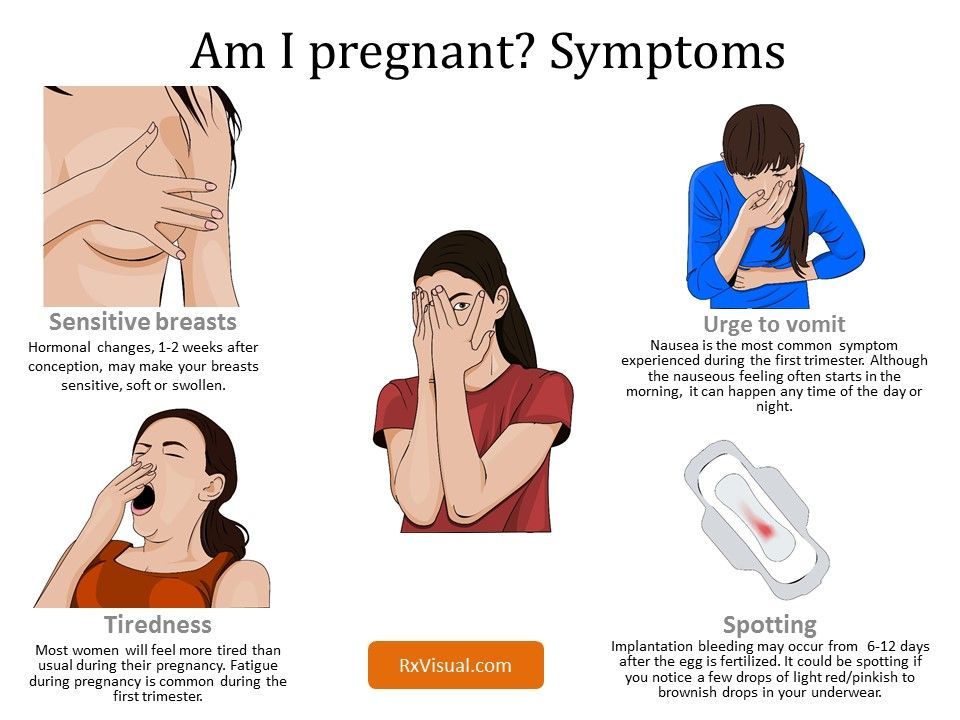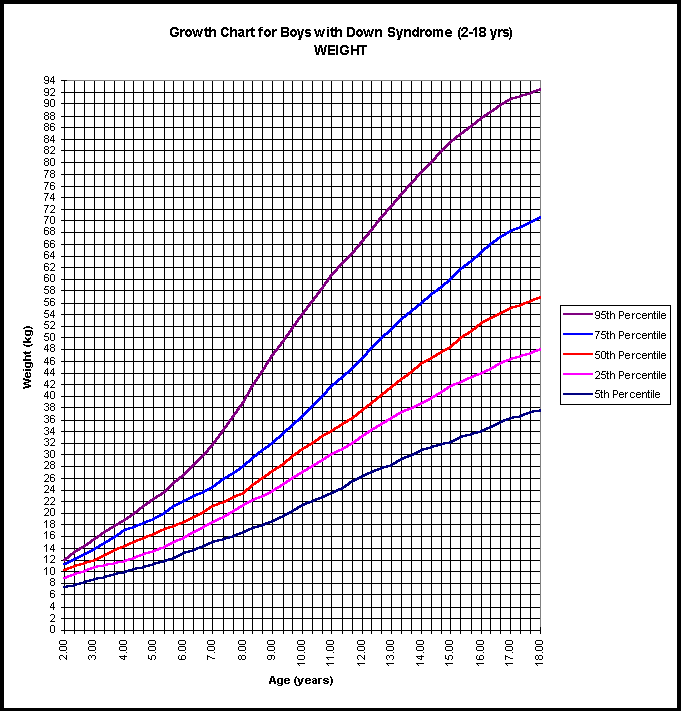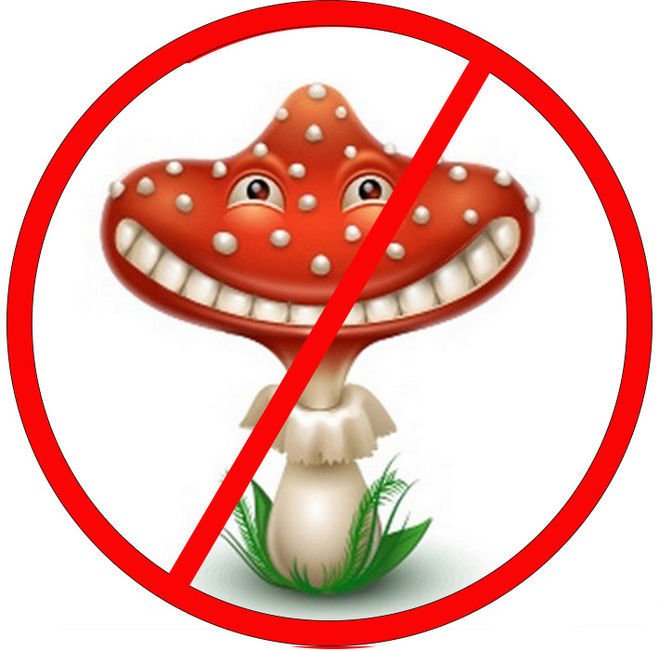Pregnancy final month
8 Tips for Surviving the Last Month of Pregnancy
So you’ve made it to the last month of pregnancy. And now you are finally in the final stretch. You see the light at the end of the tunnel. In this last month, you may find yourself starting to lose patience. And heart.
Your pregnant belly is causing strain on your back. Your swollen feet are making it hard to walk. You have heartburn every day. You are hot all day, every day. And you are sick of waiting for this baby! You are just ready to hold them! (Then magnify this feeling by 1,000 if you are past your due date!) And false alarms just create false hope!
I’ll never forget thinking I was in labor with my first son at 38 weeks. Then waking up the next day to realize labor was not happening and feeling DEPRESSED. I specifically remember walking through Hobby Lobby’s aisles the following week (at 39 weeks, one day) and telling my mom I couldn’t do it anymore. I just wanted to lie down on the floor of the store. (I may have been feeling slightly dramatic.) Little did I know I would go into labor the following day.
Mental strength in the last month of pregnancy can be just as crucial as physical strength. Maybe more. So here are some of my favorite tips for staying happy and strong during the last month of pregnancy.
1. Prepare to carry your baby until the due date. (If not longer!)
Yes, you will hear countless women tell you they went into labor at 37 weeks. And this is great. It might end up being you, too! But if it isn’t, you don’t want to assume every day from 37 weeks that this might be the day. Assume your due date will be the day. Even though only around 5% of women deliver on their baby’s due date, it is better to overshoot rather than undershoot.1 It is common for first-time mothers to go beyond their due date. (However, have your hospital bag packed and baby stuff ready at home from 36 weeks should you be surprised.) If you are past your due date and ready to meet your new baby, here are natural ways to try and induce labor.
2. Remember that the longer your baby stays in the oven, the healthier they will be.
I am always so focused on being done with pregnancy and wanting to hold my baby that I often forget to focus on how much healthier it is for baby to stay in me until they decide they are ready to come out!2 Babies born before 39 weeks have more trouble regulating body temp, have less-developed brains, and are more likely to be readmitted to the hospital for other reasons than babies born at term!2 So it is not hurting baby to remain in you. It’s helping them! You may just have a few extra stretch marks to show for it!
3. Do not put your life on pause.
Toward the end of pregnancy, many women stop planning events or committing to things assuming they may have a baby. They will decline an invitation to a girl’s night, cancel their weekly dinner with family, etc. But don’t do this. I encourage you to do the opposite. Plan all the usual stuff you usually shoot for, maybe even more.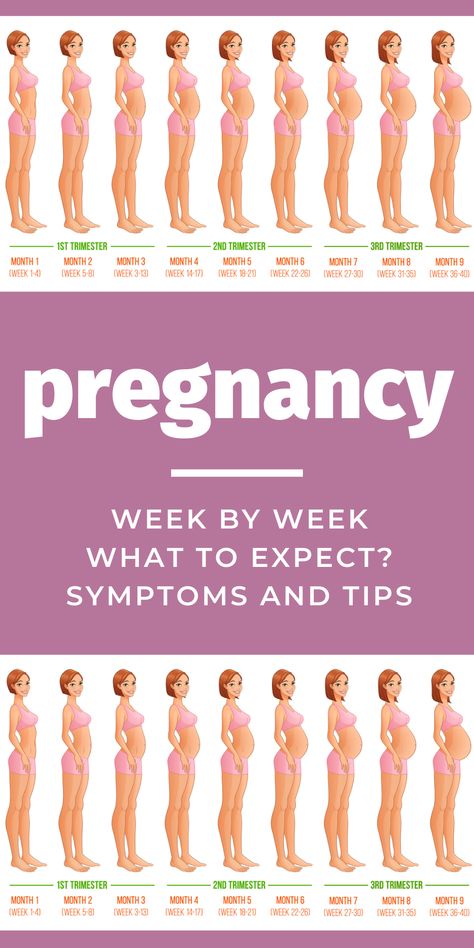 This way, you do not feel like the only thing you have to do is focus on when baby is coming! Because it can be like watching grass grow. And if baby does come, people will understand what kept you from showing up!
This way, you do not feel like the only thing you have to do is focus on when baby is coming! Because it can be like watching grass grow. And if baby does come, people will understand what kept you from showing up!
4. Focus on growth and bonding activities with your existing children.
Since it is obvious that once baby comes, your ability to focus on your existing child will be more challenging at first, use the final stretch of pregnancy to focus on them! You will long for those days when you’re trying to be with them and breastfeed a newborn. Finish their baby book. Teach them to ride a bike. Do a project in their room. Try and read all the books in the house together. Do whatever sounds fun and allows you to savor this special time!
5. Make a list of odds and ends around the house that you never get to (or just fun projects). And see how many you can cross off. Make it a contest with yourself!
Notoriously, my husband and I nested like crazy before our children’s births.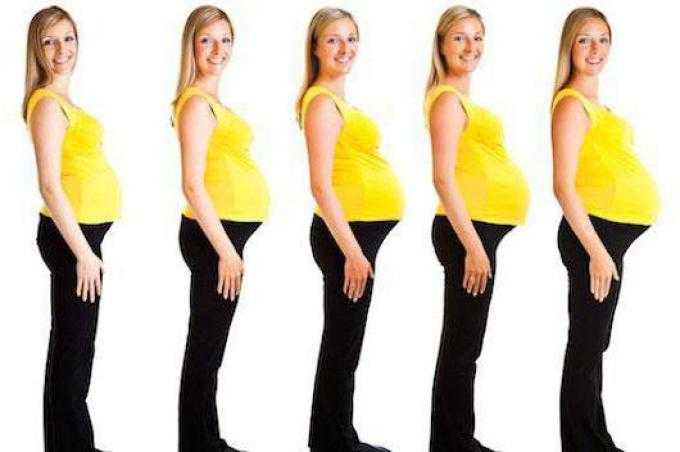 And we love house projects. So our favorite thing is to list all the little things we both want to finish in the final weeks of pregnancy. Little things like organizing the pantry, putting up curtains in their room, cleaning out storage and selling stuff on Facebook Marketplace. But “little things” is key because you don’t want to have a wall torn down when baby arrives. All projects should have the ability to wrap up quickly.
And we love house projects. So our favorite thing is to list all the little things we both want to finish in the final weeks of pregnancy. Little things like organizing the pantry, putting up curtains in their room, cleaning out storage and selling stuff on Facebook Marketplace. But “little things” is key because you don’t want to have a wall torn down when baby arrives. All projects should have the ability to wrap up quickly.
6. Pamper yourself.
The last month of pregnancy is a great time to get yourself as pretty as possible because it’s a little harder to focus on beauty once baby comes. (Okay, a lot harder!) So use that time to get your nails done, have your hair newly cut and colored, wax your eyebrows, etc. This will make you look great for delivery and give you a head start for the next few months when you just do not care. I’ll never forget having my toes freshly done with my third son, and while I was pushing, my OB said, “Your toes look great!”
See also: Should you wax (or not) before giving birth?
7.
 Sleep.
Sleep.If you do not have other children — or have an opportunity to do so — take naps. Go to bed early. Sleep as much as possible. It is factual that you will be entering a sleep-deprived state of life for the next few months to 10 years. So use your waiting period to rest up as much as possible! I cannot tell you how much I dream of sleeping and getting rest once I have a newborn!
8. Prepare freezer meals. Do bulk shopping.
Do some practical things to help make life go more smoothly once baby comes home. This is a great time to build up a stockpile of freezer meals. Or go to Target and get toilet paper and other toiletries you might need in the coming months when it is more challenging to get those items! I’ve never had so much toilet paper stored up in my house as I do before the birth of a new baby—all thanks to my nesting husband!!
See also: Find out which products you need to help prepare your body for labor and birth.
References:
1.
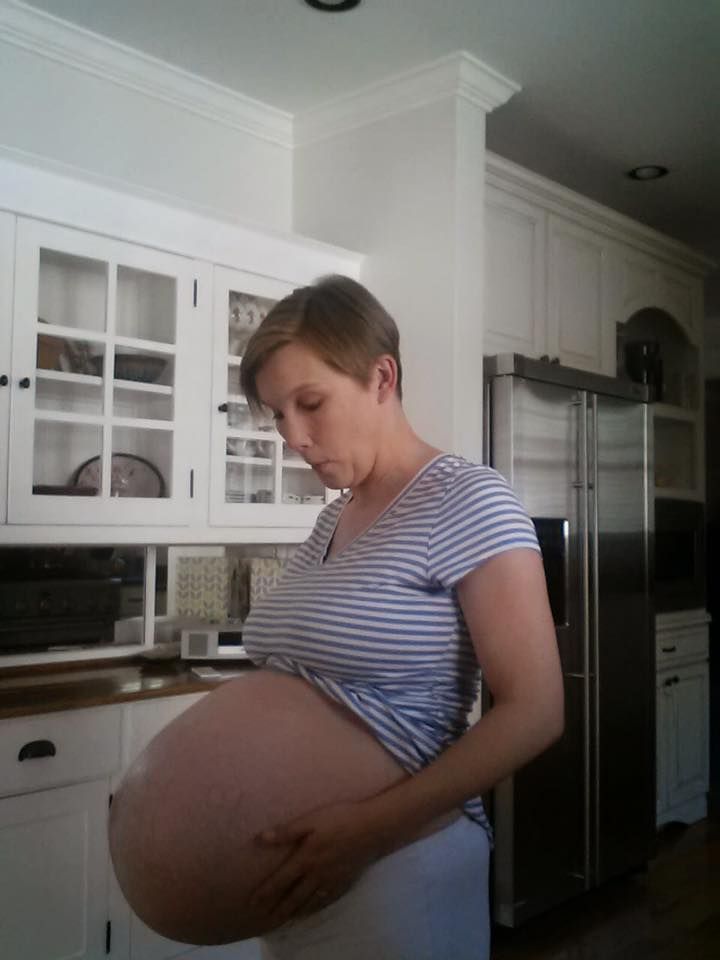 https://pubmed.ncbi.nlm.nih.gov/23932061/
https://pubmed.ncbi.nlm.nih.gov/23932061/2. https://www.marchofdimes.org/
The Third Trimester | Johns Hopkins Medicine
What You Need to Know
- As you begin the third trimester, your health care provider or midwife may change the schedule of your prenatal visits from monthly to every two weeks.
- It’s a good idea to start taking childbirth classes in preparation for your baby’s birth, especially if this is your first pregnancy.
- By the end of the third trimester, the fetus is about 19 to 21 inches long and weighs, on average, 6 to 9 pounds.
Prenatal Visits During the Third Trimester
During your second and third trimester prenatal visits, your health care provider or midwife may check the following, depending on your current medical condition and the health of your fetus:
-
Any current symptoms or discomforts
-
Your weight
-
Your blood pressure
-
Urine test.
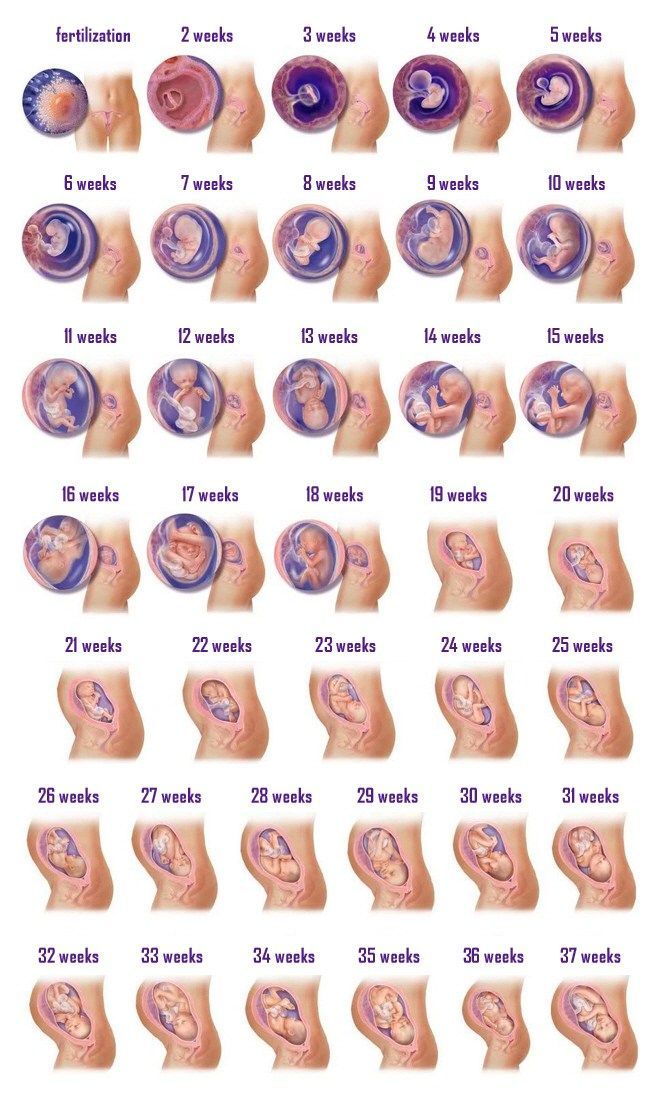 This is to find albumin, a protein that may indicate pre-eclampsia or toxemia, and glucose, which may indicate hyperglycemia.
This is to find albumin, a protein that may indicate pre-eclampsia or toxemia, and glucose, which may indicate hyperglycemia. -
Position, growth and development of your fetus
-
Height of the fundus (top of the uterus)
-
Fetal heartbeat
As you begin the third trimester, your health care provider or midwife will change the schedule of your prenatal visits from monthly to every two weeks. Your prenatal visits may be scheduled once every week in the last month. This schedule will depend on your medical condition, the growth and development of the fetus, and your health care provider or midwife’s preference.
Toward the later weeks of the pregnancy (starting at approximately the 38th week), a pelvic exam may be done to determine the dilation and effacement of the cervix. Your health care provider or midwife will also ask about any contractions and discuss labor and delivery procedures.
The Third Trimester: What to Expect
The third trimester marks the home stretch, as you prepare for the delivery of your baby. The fetus is continuing to grow in weight and size, and the body systems finish maturing. You may feel more uncomfortable now as you continue to gain weight and begin to have false labor contractions (called Braxton-Hicks contractions).
During the third trimester, it is a good idea to start taking childbirth classes in preparation for the big day. This is especially true in the case of first pregnancies.
Johns Hopkins Hospital Designated as Baby-Friendly
The Baby-Friendly Hospital Initiative, a global program launched by the World Health Organization and the United Nations Children’s Fund, has designated The Johns Hopkins Hospital as Baby-Friendly. This designation is given to hospitals and birthing centers that offer an optimal level of care for infant feeding and mother-baby bonding.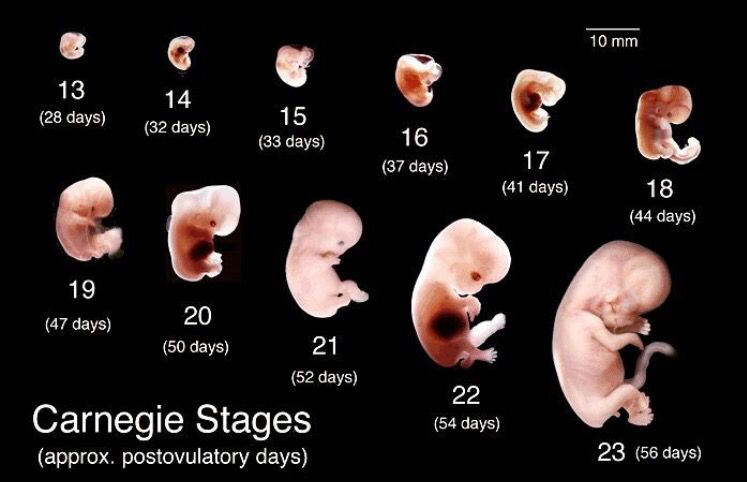
Learn more
The Third Trimester: Changes to Your Body
In the third trimester, some women become increasingly uncomfortable as their due date nears. As the fetus grows in size and crowds the abdominal cavity, some mothers-to-be have difficulty taking deep breaths or getting comfortable at night for sleep, while others are free from any discomfort as they anxiously await the arrival of their new son or daughter.
The following is a list of changes and symptoms that you may experience during the third trimester:
-
Your fetus radiates body heat, causing you to feel hot from increased skin temperature.
-
The increased urinary frequency returns due to increased pressure being placed on the bladder.
-
Blood pressure may decrease as the fetus presses on the main vein that returns blood to the heart.
-
Swelling of the ankles, hands and face may happen (called edema), as you continue to retain fluids.
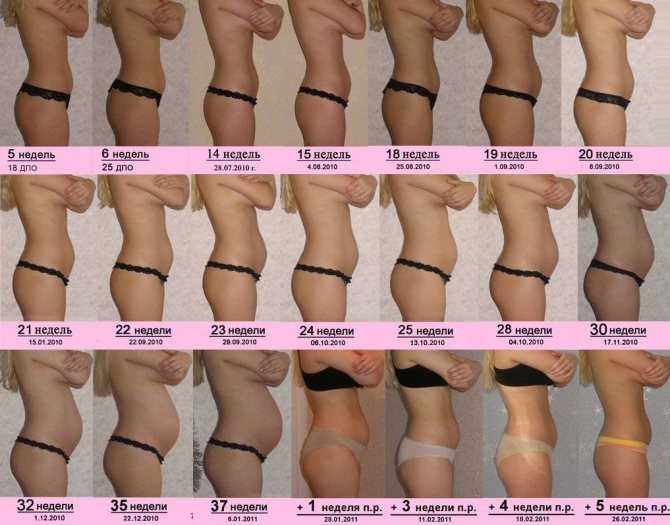
-
Hair may begin to grow on your arms, legs and face due to increased hormone stimulation of hair follicles. Hair may also feel coarser.
-
Leg cramps may happen more often.
-
Braxton-Hicks contractions (false labor) may begin to happen at irregular intervals in preparation for childbirth.
-
Stretch marks may appear on the stomach, breast, thighs and buttocks.
-
Colostrum (a fluid in the breasts that nourishes the baby until the breast milk becomes available) may begin to leak from your nipples.
-
Dry, itchy skin may persist, particularly on the stomach, as the skin continues to grow and stretch.
-
Your libido (sexual drive) may decrease.
-
Skin pigmentation may become more apparent, especially dark patches of skin on the face.
-
Constipation, heartburn and indigestion may continue.
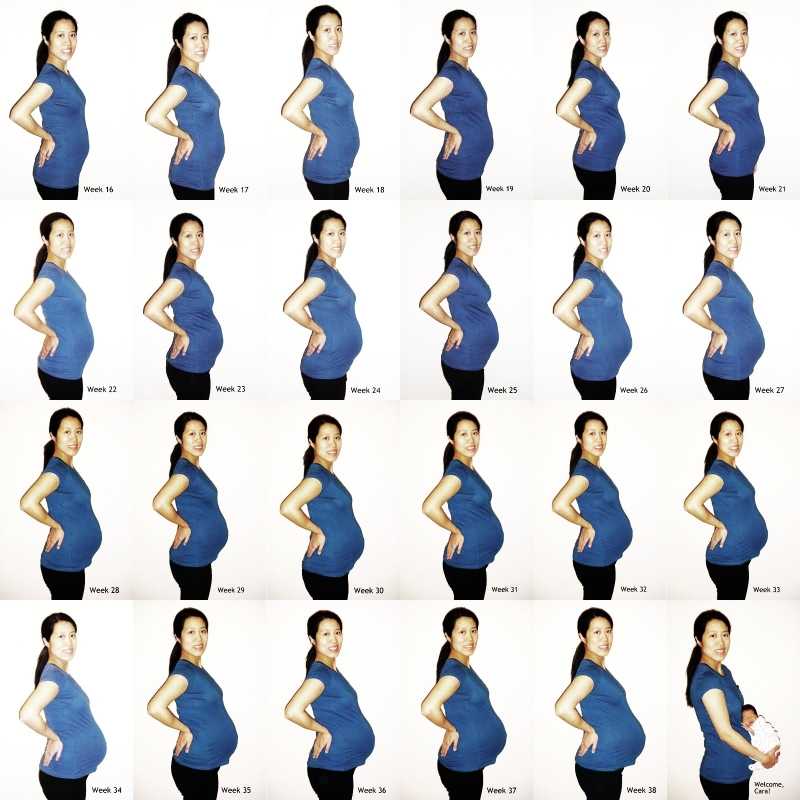
-
You will have increased white-colored vaginal discharge (leukorrhea), which may contain more mucus.
-
Backaches may persist and increase in intensity.
-
Hemorrhoids may persist and increase in severity.
-
Varicose veins in the legs may persist and increase in severity.
The Third Trimester: Fetal Development
During the third trimester, your fetus continues to grow in size and weight. The lungs are still maturing, and the fetus begins to position itself head down. By the end of the third trimester, the fetus is about 19 to 21 inches long and weighs, on average, 6 to 9 pounds. Fetal development during the third trimester includes:
-
The fetus can see and hear.
-
The brain continues to develop.
-
The kidneys and lungs continue to mature.
-
By the 36th week, the head may “engage” (drop into the pelvic area), a process called lightening.

-
The bones of the skull remain soft to make it easier to pass through the birth canal.
-
For many babies, the irises of the eyes are slate blue. The permanent eye color will not appear until several days or weeks after birth.
-
The fetus can suck its thumb and has the ability to cry.
-
By 38 to 40 weeks, the fetus’ lanugo (fine, soft hair on the body and limbs) has disappeared almost completely.
-
By 38 to 40 weeks, the lungs have matured completely.
-
The baby is covered in vernix caseosa (or simply called vernix), a creamy, protective coating on the skin.
-
The head will usually turn downward during the last couple of weeks of pregnancy.
The ninth month of pregnancy: from what week does the development of the fetus and the stomach begin at the 9th month of pregnancy
The entire pregnancy for a woman is a very quivering and exciting time.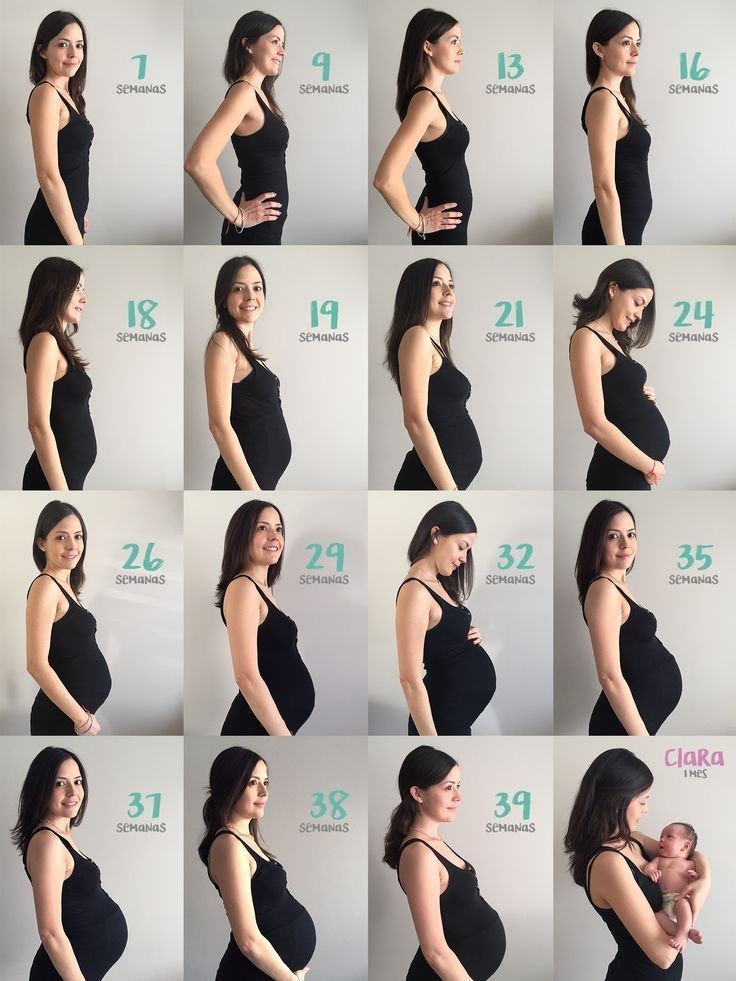 In recent weeks, the most stressful, fears may appear. A woman wants the birth to go smoothly, the child sees this world and comes into it without injury. Keeping calm over the past month will help information about how the baby is developing now, what changes are taking place in the body. So you will be sure that everything is going according to plan, get rid of doubts and focus on the pleasant expectation.
In recent weeks, the most stressful, fears may appear. A woman wants the birth to go smoothly, the child sees this world and comes into it without injury. Keeping calm over the past month will help information about how the baby is developing now, what changes are taking place in the body. So you will be sure that everything is going according to plan, get rid of doubts and focus on the pleasant expectation.
From which week the 9th month of pregnancy begins
The 9th month of pregnancy is calculated as 32 weeks from the date of the last menstruation. During this period, the psychological mood of a woman changes. Until recently, she felt tired, heaviness. But within the last month, everything can change. New forces will appear, the woman will feel a surge of energy - as if she will have a second wind.
The last days before childbirth, many future mothers are engaged in cleaning, restoring comfort. Experts call this the "nesting effect". A woman wants to feel comfortable and clean before the baby arrives.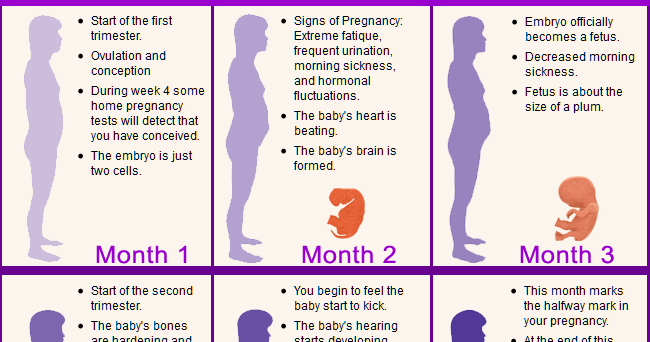 But at the end of 9months, you do not need to move and lift weights yourself, so as not to provoke premature birth.
But at the end of 9months, you do not need to move and lift weights yourself, so as not to provoke premature birth.
Signs, symptoms and sensations
During the 9th month of pregnancy, new sensations appear in the woman's body. The bottom of the uterus, the abdomen descend, so the child begins to prepare to move down. During this period, heartburn, constipation, which appeared during pregnancy, can also pass. But the pain in the lower abdomen, the pubis will remain, as will the swelling.
Back pain may occasionally worsen. The body begins to prepare for childbirth, the level of estrogen rises, which provokes training contractions.
In the last weeks of pregnancy, a woman may notice mucous discharge. Normally, they should be colorless or pinkish in color. Do not worry if there is no sharp, unpleasant smell.
Discharge indicates that the gestational age is ending, the mucous plug is coming off. This is a kind of barrier that protects the fetus from infections, bacteria.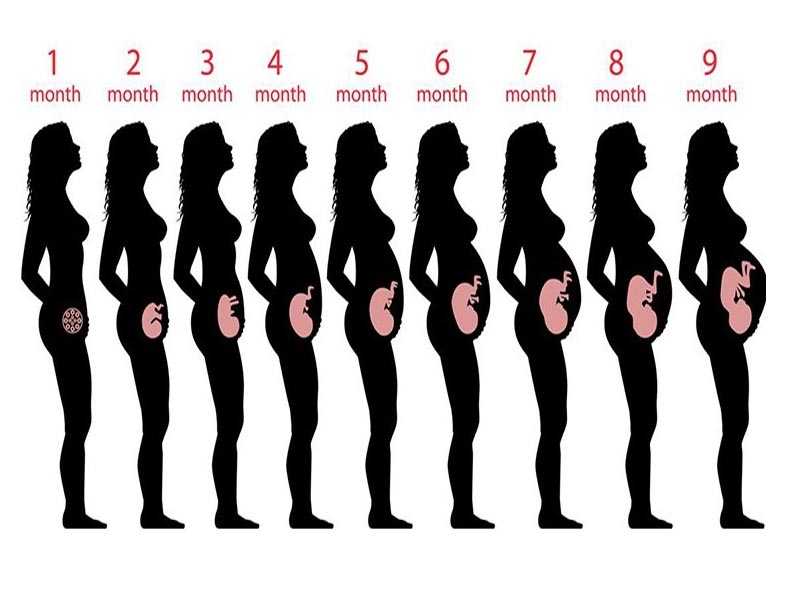 If at the same time the stomach does not hurt, and there is no other discomfort, you can not rush to the hospital.
If at the same time the stomach does not hurt, and there is no other discomfort, you can not rush to the hospital.
As a rule, childbirth begins after a few days, the period can stretch up to a week. Impurities of pus and blood are considered an alarming sign. In this case, the visit to the doctor should not be postponed.
Another problem that often occurs in the last stages of pregnancy is hydronephrosis. The ureter expands and lengthens due to the fact that the pressure of the uterus increases, as well as on the bladder of a pregnant woman (she wants to go to the toilet more often).
In general, the ninth month passes relatively calmly, the body is preparing for an early birth.
Belly at 9 months of pregnancy
In the last month of pregnancy, women often notice that the position of the abdomen changes slightly, it sinks. If the pregnancy is the first, this can be observed about a month before delivery. It becomes harder for the expectant mother to walk and breathe. The baby's head gradually moves down towards the exit.
The baby's head gradually moves down towards the exit.
Also by the end of the 9th month of pregnancy there are periodic pain in the lower abdomen. In intensity, they can be compared with pain during menstruation.
If the pain increases, the time interval begins to shorten, then you need to urgently pack your bags to the maternity hospital. Usually, the doctor gives the woman a list in advance of what things should be with her during hospitalization.
Sex at the 9th month of pregnancy
In the last weeks of pregnancy, a woman is more concerned about childbirth, and often intimate life fades into the background. If sex does not bring discomfort, and the partners remain attracted, then sexual intercourse is acceptable (in the absence of contraindications). Sex position for 9month should be comfortable for a woman. Make sure that the partner does not press on the stomach.
In the case when the pregnancy is complicated, the doctor may recommend sexual rest.
Mother's weight during pregnancy
During all months of pregnancy, most women notice weight gain. Normally, during this period, you can gain 9-12 kg, of course, it all depends on the condition of the expectant mother, her lifestyle. If the body weight is insufficient, the increase is greater, if the weight is overweight, then the indicator may be below average.
The baby bears most of the weight. It is also important to take into account the weight of the placenta, the fluid that accumulates, even the blood flow is increased by half, which also increases the performance.
Women are often interested in how long it will take to get back in shape. Usually it is 9 months, but each situation remains individual.
Stretch marks during pregnancy
Few people manage to avoid stretch marks during pregnancy. Violet-burgundy stripes appear in the abdomen, chest, thighs. They cannot be cured, but you can correct the situation with timely prevention - regularly moisturize and nourish the skin special means for pregnant women.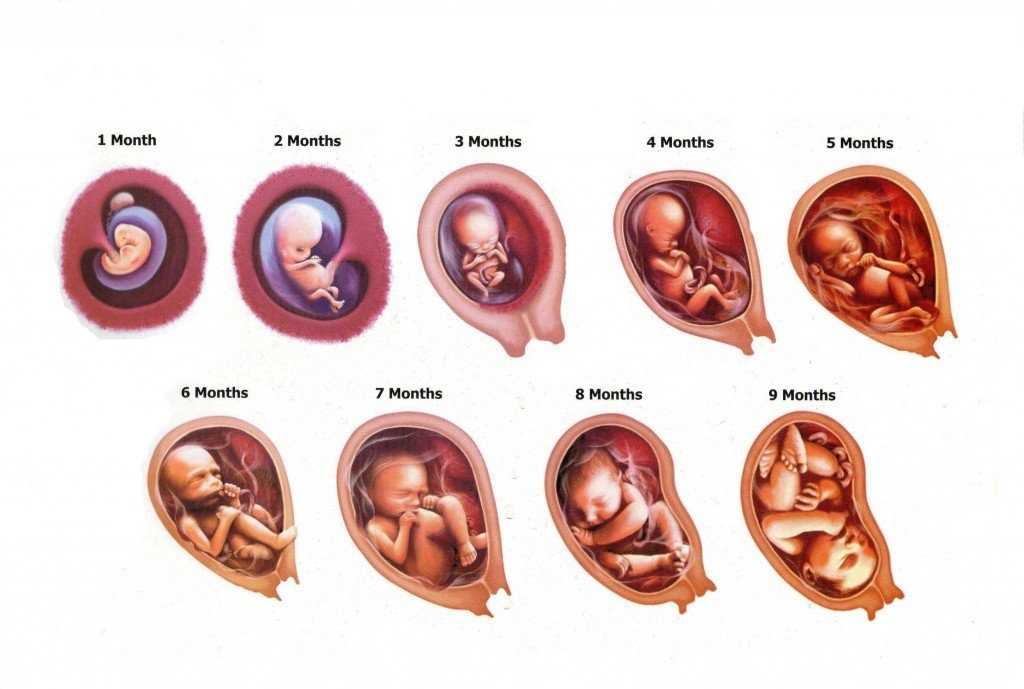
How the fetus develops
When the pregnancy reaches 36 weeks, the baby becomes crowded in the uterine cavity. He has to curl up into a ball, pressing his arms and legs to his body. The weight of the fetus on average reaches 2500 g.
Week 37 is characterized by the fact that the amniotic fluid gradually decreases, this is necessary so that the child has more room to move. If we talk about how long a child is considered full-term, this is exactly 37 weeks. During this period, childbirth is possible, but it is better for the baby to stay a little longer with the mother.
A child at 38 weeks has already fully formed organs and internal systems. Only the digestive system needs another 1-2 years after childbirth to fully adapt.
At 39 weeks, the baby is actively building up subcutaneous fat. His weight during this period can reach 3.1 kg, and height - 51 cm.
40th week. The bone tissue of the child becomes dense, the body stores animal starch, which then turns into glucose.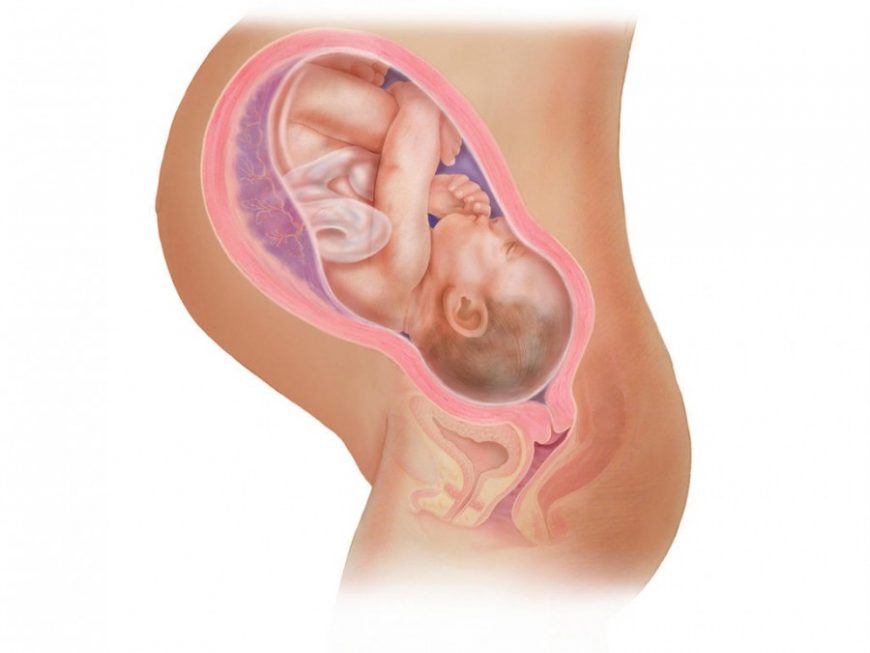 The weight of the baby is about 3.3 kg.
The weight of the baby is about 3.3 kg.
According to statistics, childbirth begins at 40-42 weeks.
Ultrasound and tests in the ninth month of pregnancy
During the last month of pregnancy, the woman has planned 2 visits to the gynecologist.
What the specialist does during the examination:
- measures blood pressure;
- fixes waist circumference, weight;
- reviewing urinalysis results;
listens to the child's heartbeat, evaluates the cardiotocography chart.
The doctor also checks the degree of dilatation of the cervix, if necessary, the woman can immediately be hospitalized in the maternity ward. Ultrasound is performed according to individual indications.
Recommended limits for expectant mothers
Mostly related to heavy lifting and flying. If the woman's health is stable, you can continue to lead a normal life.
If abdominal pains, mucous discharge mixed with pus, blood begin, observation in the hospital is necessary. In this case, air travel and long-distance travel are prohibited.
How to eat right in the 9th month of pregnancy
Throughout pregnancy, a balanced and proper diet is important for the expectant mother. The body needs more nutrients and vitamins. Eat more foods containing iron, folic acid and other beneficial micronutrients.
During this period, the expectant mother should receive enough vitamins (C, D3), calcium, because the developing child actively “stores” it.
A balanced diet will help you get rid of stool problems. If a woman suffers from constipation, legumes and cabbage, milk and sweets, bakery products should be excluded. In the diet, there must be fermented baked milk, kefir, yogurt.
Childbirth preparation courses
Classes for expectant parents are usually available at the antenatal clinic. You can walk them with a partner.
The courses tell about the process of childbirth, teach the techniques of proper breathing.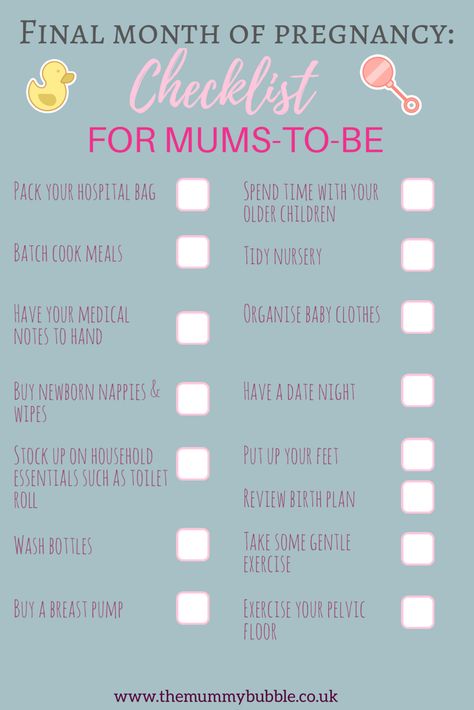 Experts explain all the subtleties of caring for a newborn baby.
Experts explain all the subtleties of caring for a newborn baby.
Signs of approaching labor
- The child descends, the woman feels an increased urge to urinate. It becomes easier to breathe, the pressure on the diaphragm weakens.
- The pain in the groin increases - the pelvic bones diverge.
- Increasing back pain.
- Joints become more flexible.
- The mood changes quickly.
- Weight gain stops.
- A small amount of amniotic fluid is excreted.
As soon as a woman sees the discharge of amniotic fluid, she needs to go to the hospital. The contractions will increase, the time between attacks will decrease.
What you need to take to the hospital
At the 9th month, you must always be ready for the birth process to begin. During this period, many choose a maternity hospital, a stroller, buy other necessary things for a newborn.
A woman should be especially careful when packing bags for the maternity hospital.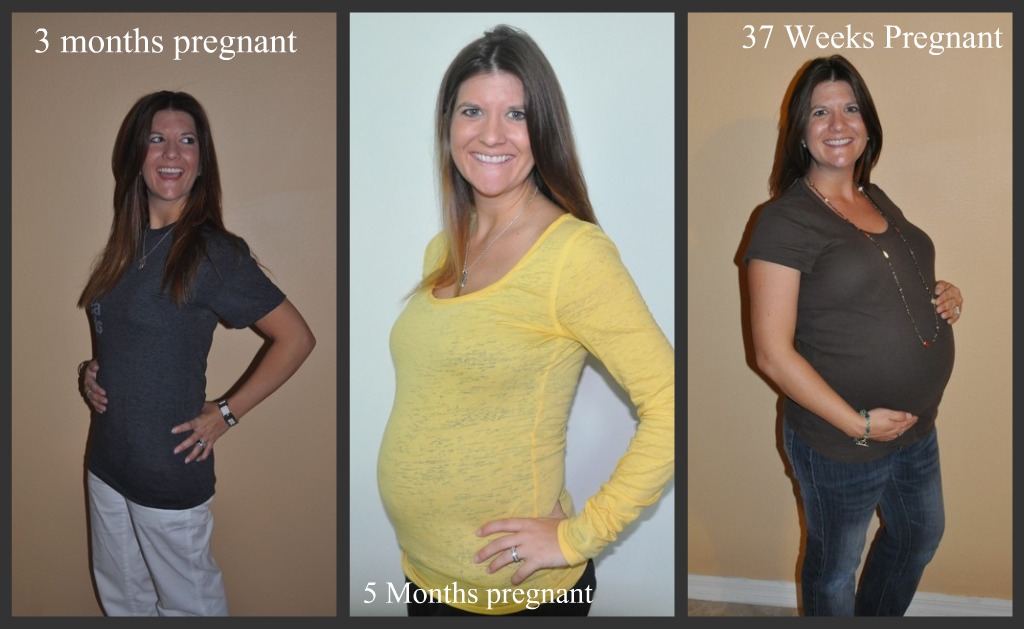 Each hospital has separate lists for women in labor, you need to focus on them.
Each hospital has separate lists for women in labor, you need to focus on them.
What you will definitely need:
- Documents: passport, policy, exchange card, agreement with the maternity hospital, birth certificate.
- Personal items: slippers, bathrobe, underwear, nightgowns, socks, maternity bra, pads, bra pads.
- Postpartum bandage.
- Hand towels, shower.
- Hygiene items: dry and wet wipes, comb and toothpaste, soap and shampoo, moisturizer.
- Water and snacks.
- Things for the baby: clothes, diapers, diapers, pacifier.
- Phone with charger.
This is a generalized list of everything you need. The list can be longer according to the requirements of the hospital (or if you need something special).
Possible complications and deviations
If there are no complications, the expectant mother spends the time before giving birth at home, goes to the hospital according to the schedule.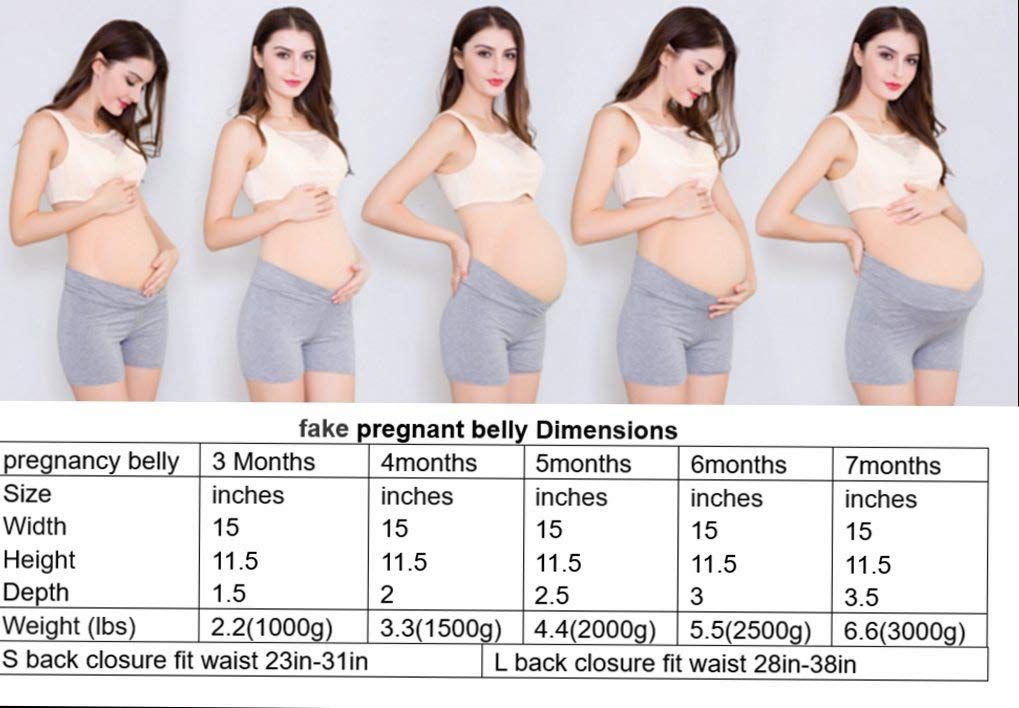 If you notice active discharge from the vagina with blood, leakage of water, then you need to urgently call an ambulance. You can not ignore severe pain and the fact that the fetus has stopped moving.
If you notice active discharge from the vagina with blood, leakage of water, then you need to urgently call an ambulance. You can not ignore severe pain and the fact that the fetus has stopped moving.
Third trimester of pregnancy (from 28 to 40 weeks)
At 30 weeks pregnant, you are ready to go on maternity leave. In the case of twins, prenatal leave is from 28 weeks. Active work, physical and mental overload during this period can provoke premature birth.
It's time to put on the bandage - it will help your baby stay in the right position and you in good shape after childbirth.
The child still needs a lot of nutrients, vitamins, mineral salts. Use your vacation to relax, but don't lie around all day. We hope that hiking in the fresh air has become a habit for you.
Do not forget to keep track of the ratio of drunk and excreted liquids. Accumulating in the body, the fluid disrupts the functioning of the kidneys, increases the load on the heart, which causes an increase in blood pressure.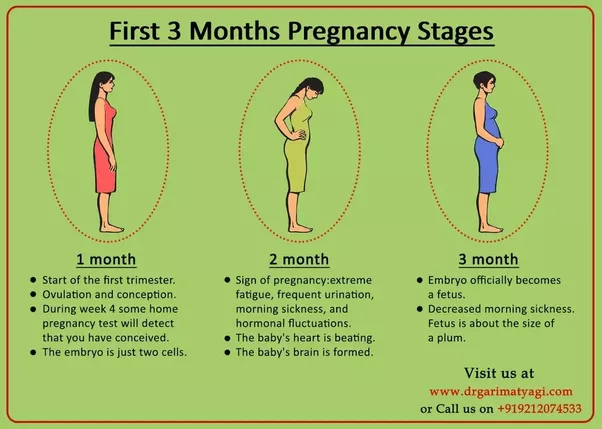 As a result, the child suffers: he lacks nutrients, oxygen.
As a result, the child suffers: he lacks nutrients, oxygen.
A sharp headache, flashing flies before the eyes, convulsions are signs of eclampsia, a severe complication of pregnancy that poses a threat to the life of the mother and child. Urgently call the ambulance.
At this time, the uterus becomes very sensitive to the pushes and movements of the child, its muscles periodically tighten. It's like she's doing gymnastics. If this rarely happens and you do not feel pain, then everything is in order and there is no cause for concern. But if the uterus tenses often, pain appears - call an ambulance. If spotting appears, amniotic fluid is pouring out, do not wait for contractions - immediately to the hospital!
Sex life from 32-33 weeks is not recommended.
At 32 weeks, another scheduled ultrasound examination is scheduled to assess the correct functioning of the placenta, if necessary, the study of fetal heart sounds.
The last month is the most difficult.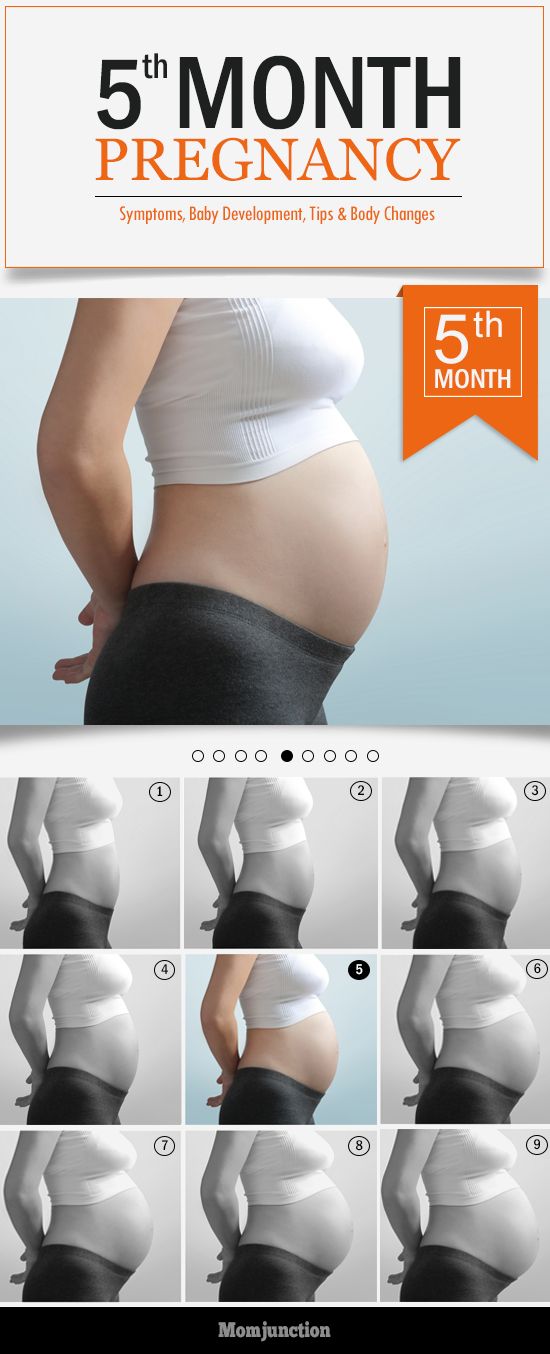 The load on the body has increased to the maximum. You are already tired of the long wait. Approximately two weeks before delivery, a mucous plug will come off the cervix, which is a lump, sometimes slightly stained with blood.
The load on the body has increased to the maximum. You are already tired of the long wait. Approximately two weeks before delivery, a mucous plug will come off the cervix, which is a lump, sometimes slightly stained with blood.
Do not forget to make up for the lack of calcium in the body - until the last day of intrauterine existence, the child intensively stores minerals. Eat fully and properly - the fetus eagerly takes everything valuable for the formation of the body. He needs protein now. Be sure to take a prenatal multivitamin. Rest during the day. Lie on your side, slightly raise your legs.
Many women suffer from constipation at this time. Only a rational diet will help. Eliminate grapes, fresh cabbage, peas and other legumes, fresh milk, muffins, sweets. Useful: curdled milk, fermented baked milk, kefir. Steamed dried fruits normalize bowel function well. Don't take laxatives. In the last trimester of pregnancy, they can provoke uterine contractions and cause premature birth.

